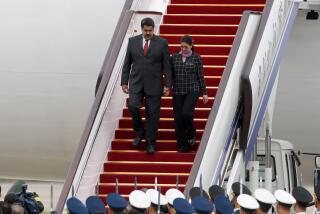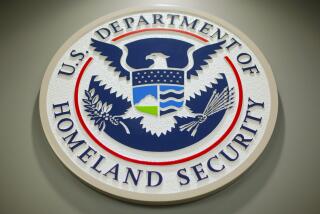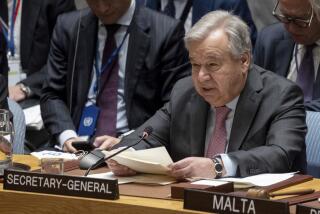Obama plans to remove Cuba’s designation as state sponsor of terrorism
President Obama plans to remove Cuba from the U.S. list of state sponsors of terrorism after more than a quarter-century, the White House said Tuesday, taking a major step toward Obama’s goal of normalizing relations with the island nation.
The announcement came just days after Obama’s face-to-face historic meeting with Cuban President Raul Castro at an international summit in Panama. The two leaders discussed the terrorism designation as well as reopening embassies in each other’s nations to fully restore diplomatic ties after more than five decades of Cold War antagonism.
The president’s action triggers a 45-day review period in Congress, after which the designation could become official.
The list Cuba would be removed from consists of countries determined by the State Department to have repeatedly provided support for acts of international terrorism. The designation carries sanctions, including bans on U.S. foreign assistance, defense exports and sales, as well as controls on the exports of some goods and financial restrictions.
Iran, Sudan and Syria are also on the list, and Cuba has been since 1982. North Korea was removed from the list by President George W. Bush.
The designation has been a key sticking point in negotiations with the Cuban government. Its removal paves the way for the two countries to take more steps toward reestablishing diplomatic ties, including opening embassies.
In his notification to Congress on Tuesday, the president certified that the Cuban government has not provided support for international terrorism in the last six months and that it has provided assurances that it will not support such acts in the future.
“Circumstances have changed since 1982,” Secretary of State John F. Kerry said in a statement, which noted the designation was initially made because of Cuba’s efforts to promote “armed revolution by force” in Latin America. “Our hemisphere and the world look very different today than they did 33 years ago.”
The U.S. will continue to have differences with the Cuban government, White House Press Secretary Josh Earnest acknowledged.
“But our concerns over a wide range of Cuba’s policies and actions fall outside the criteria that is relevant to whether to rescind Cuba’s designation as a state sponsor of terrorism,” Earnest said. “The United States will continue to support our interests and values through engagement with the Cuban government and people.”
Congress has 45 days to vote to block the president’s action. Some Democrats, including Sen. Robert Menendez of New Jersey, are among the strongest critics of removing Cuba from the terrorism sponsor list. But it is unlikely that opponents will be able to muster a veto-proof supermajority in both chambers.
Still, Congress is unlikely to heed the president’s request to pass legislation lifting the U.S. embargo of Cuba.
Republican Rep. Mario Diaz-Balart, a Cuban American from Florida, disputed the administration’s view that Cuba is no longer sponsoring terrorism and said the president has “demonstrated that his eagerness to capitulate to dictators has no bounds.”
“The long-suffering Cuban people, who continue to struggle for the realization of human rights and democracy in Cuba, and the American people, living with an aggressive anti-American dictatorship 90 miles from our shores, deserve much better from the president,” he said.
Menendez and other members of Congress say Cuba is a haven for terrorists and thus deserves the designation. Menendez said Basque separatists wanted by Spain and leftist rebels sought by Colombia view Cuba as a “place of refuge.”
Rep. Eliot L. Engel of New York, the top Democrat on the House Foreign Affairs Committee, who recently traveled to Cuba, called the change in designation a “logical step.”
“The ball is now in the Cuban government’s court to respond by allowing for greater political pluralism, guaranteeing freedom of speech and ensuring that each and every Cuban political prisoner is freed,” he said.
Administration officials said they were “pretty optimistic” that Tuesday’s action could be followed soon by the reopening of embassies, but only if Cuban officials agree to give American diplomats the same freedom they enjoy in other nations.
“We’re going to continue to pursue those requirements,” said one official who briefed reporters on the condition of anonymity to discuss the administration’s decision. “We’re still not quite there yet.”
Twitter: @mikememoli
More to Read
Sign up for Essential California
The most important California stories and recommendations in your inbox every morning.
You may occasionally receive promotional content from the Los Angeles Times.











